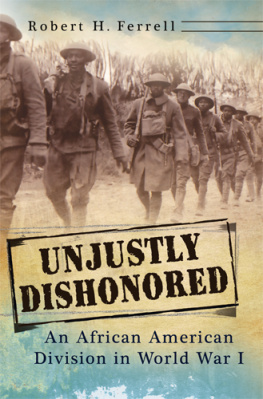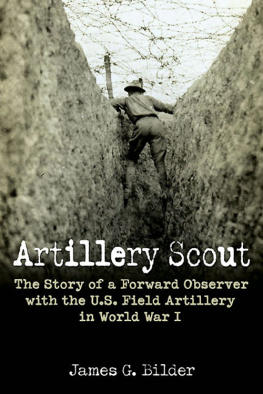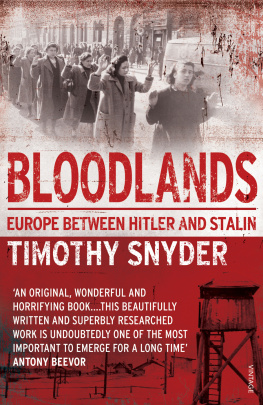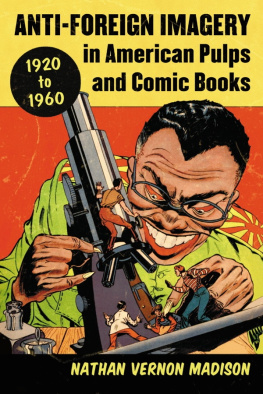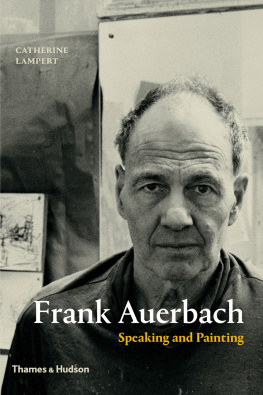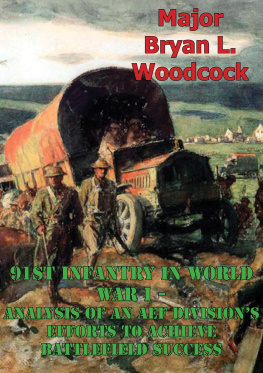Ferrell - Unjustly Dishonored: an African American Division in World War I
Here you can read online Ferrell - Unjustly Dishonored: an African American Division in World War I full text of the book (entire story) in english for free. Download pdf and epub, get meaning, cover and reviews about this ebook. City: Columbia, year: 2014, publisher: University of Missouri Press, genre: Detective and thriller. Description of the work, (preface) as well as reviews are available. Best literature library LitArk.com created for fans of good reading and offers a wide selection of genres:
Romance novel
Science fiction
Adventure
Detective
Science
History
Home and family
Prose
Art
Politics
Computer
Non-fiction
Religion
Business
Children
Humor
Choose a favorite category and find really read worthwhile books. Enjoy immersion in the world of imagination, feel the emotions of the characters or learn something new for yourself, make an fascinating discovery.
- Book:Unjustly Dishonored: an African American Division in World War I
- Author:
- Publisher:University of Missouri Press
- Genre:
- Year:2014
- City:Columbia
- Rating:3 / 5
- Favourites:Add to favourites
- Your mark:
- 60
- 1
- 2
- 3
- 4
- 5
Unjustly Dishonored: an African American Division in World War I: summary, description and annotation
We offer to read an annotation, description, summary or preface (depends on what the author of the book "Unjustly Dishonored: an African American Division in World War I" wrote himself). If you haven't found the necessary information about the book — write in the comments, we will try to find it.
Ferrell: author's other books
Who wrote Unjustly Dishonored: an African American Division in World War I? Find out the surname, the name of the author of the book and a list of all author's works by series.
Unjustly Dishonored: an African American Division in World War I — read online for free the complete book (whole text) full work
Below is the text of the book, divided by pages. System saving the place of the last page read, allows you to conveniently read the book "Unjustly Dishonored: an African American Division in World War I" online for free, without having to search again every time where you left off. Put a bookmark, and you can go to the page where you finished reading at any time.
Font size:
Interval:
Bookmark:

The American Military Experience Series
John C. McManus, Series Editor
The books in this series portray and analyze the experience of Americans in military service during war and peacetime from the onset of the twentieth century to the present. The series emphasizes the profound impact wars have had on nearly every aspect of recent American history and considers the significant effects of modern conflict on combatants and noncombatants alike. Titles in the series include accounts of battles, campaigns, and wars; unit histories; biographical and autobiographical narratives; investigations of technology and warfare; studies of the social and economic consequences of war; and in general, the best recent scholarship on Americans in the modern armed forces. The books in the series are written and designed for a diverse audience that encompasses nonspecialists as well as expert readers.
Copyright 2011 by
The Curators of the University of Missouri
University of Missouri Press, Columbia, Missouri 65201
Printed and bound in the United States of America
All rights reserved
5 4 3 2 1 15 14 13 12 11
Cataloging-in-Publication data available from the Library of Congress.
ISBN 978-0-8262-1916-9
 This paper meets the requirements of the
This paper meets the requirements of the
American National Standard for Permanence of Paper
for Printed Library Materials, Z39.48, 1984.
Designer: Stephanie Foley
Typesetter: FoleyDesign
Printer and Binder: Thomson-Shore, Inc.
Typefaces: Palatino and Stencil
ISBN 978-0-8262-7246-1 (electronic)
FOR MANY YEARS the reputation of the Ninety-second Division, the only African American division in France in World War I, 19171918, has been tarnished, to say the least; in fact, the division has had no reputation except for failure. White Americans referred to its poor record. Black Americans spoke of racial prejudice as the source of the division's ills. No one spoke well of its military achievements. Nearly a century has passed, down to the present writing, and little or nothing has changed. To military commentators the division's history was and is an embarrassment.
The purpose of the present book is to turn the division's reputation around. In reality it did quite well militarily and would have done even better if it had possessed better white officersall the field officers, majors and above, were white, while the company officers of infantry units (captains, lieutenants) were black. The single infantry regiment of the division that went into the Argonne in the last days of September 1918 had a white colonel who barely presided over his big unit, four thousand men; Col. Fred R. Brown wrote well and hence could explain himself clearly and seemingly sensibly, but did little to hold his regiment together and gave vague directions to his three battalion commanders. In the 368th Regiment the battalion commanders were a varied lot. Only one of them, John N. Merrill, had any executive ability, and he was an embarrassment to the American Army that prided itself on good relations, democratic relations, between officers and men, for he had spent years in the army of Persia where democratic tendencies did not exactly flourish, and even served a few months with the British Indian Army. In September 1918 his command technique was to fire pistol shots over the heads of his charges. As for the other two infantry majors of the 368th, Max A. Elser could not make up his mind during the first two nights out in no-man's-land, bringing hisbattalion's companies back to where they started or keeping them out in the dark, and decided, as one could have guessed, to bring them in (Colonel Brown, of course, had not told him what to do). Maj. Benjamin F. Norris in civil life was a New York City lawyer, a logical man who felt that if he gave a command his men would follow itbecause he passed his commands to his officers. One could go on from there. Merrill kept his charges together with a masterful intent and took them into Binarville, a group of shelled basements a few kilometers above the regiment's starting point. The other two battalions went to pieces in the effort.
The collapse of most of the 368th Regiment labeled the Ninety-second Division, this despite the fact that most of the other American white divisions did poorly in the first three attacks in the great battle of the Meuse-Argonne, which began September 26, 1918, and went on until the Armistice of November 11. Only in the last attack, beginning November 12, did the Americans as a whole turn their reputation around into an astonishing victory. For the African American division nothing sufficed to assist in retrieving its reputation. The division's engineer regiment performed very well. Its artillery brigade could not have been better; so wrote its surprised and enormously pleased brigadier general, a no-nonsense engineer in civil life with an office on State Street in Boston. And in the only attack mounted by the divisions of Lt. Gen. Robert L. Bullard, with the small force he and Gen. John J. Pershing described as the Second Army, on November 1011, the only division that did anything, took German territory, was the Ninety-second.
It is a piquant story, heartwarming to see what a big group of black draftees, twenty-five thousand men, a large force, could do when given half a chance and a few real leaders such as Brig. Gen. John Sherburne of the artillery, or Maj. Warner A. Ross who commanded the Second Battalion, 365th Infantry, and in civil life was a lawyer from Lafayette, Indiana. This book is the first full-length archival-based account of the Ninety-second Division, based on the records of the National Archives in College Park, Maryland; the personal records of the U.S. Army in the Army War College in Carlisle Barracks, Pennsylvania; and a group of interviews, 740 pages, of officers and men of the Ninety-second Division conducted in 1919 by a colonel in the Inspector General Department, lost since 1923,unread even at that time, which an able archivist found in the stacks at College Park.
One of the readers of this account in its typescript remarked on the lack of soldier testimony, its concentration on the views and outlooks of officers. On this point I need to offer some explanation. The reader quite rightly asked what the men themselves, rather than the officers, had to say about their officers, black and white, and their own hopes for a better future in the United States because of their service in a great war. Here, let me say, is an entirely justified question. No account of any military unit, large or small, is anywhere near complete without setting out the thoughts of the men. Alas, for the Ninety-second none appears to exist. Researchers on African Americans and the U.S. Army have found very little on the men themselves. For whatever reason or reasons, one fears that as in so many important aspects of history, this portion of the Ninety-second's past has been lost.
The other reader of the typescript manuscript pointed out the World War II sequel to the history of the Ninety-second in World War I, what followed from 1941 to 1945. Himself a National Guard brigadier general, this scholar wrote eloquently of how the U.S. Army went into the second great war of the last century with army leaders determined to have no more failures, they said privately, such as happened in 19171918. Relenting, the army's leadership organized the Ninety-second again, with careful leadership and careful training. The reorganized division went into the Italian campaign against the German Army, received clear assignments, and performed well. The division of World War I was a preliminary to a new outlook based on reality rather than imagination. He pointed out what would happen later, the experience of a Gen. Colin Powell commanding in action both African American and white troops, a splendid scene compared to its beginning.
Font size:
Interval:
Bookmark:
Similar books «Unjustly Dishonored: an African American Division in World War I»
Look at similar books to Unjustly Dishonored: an African American Division in World War I. We have selected literature similar in name and meaning in the hope of providing readers with more options to find new, interesting, not yet read works.
Discussion, reviews of the book Unjustly Dishonored: an African American Division in World War I and just readers' own opinions. Leave your comments, write what you think about the work, its meaning or the main characters. Specify what exactly you liked and what you didn't like, and why you think so.

